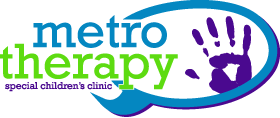Fall 2018 Newsletter
School Services
With the school year getting underway, school-based therapy services will also be starting back up for many children. School districts provide valuable therapy services to students to help them achieve their educational goals. Parents, caregivers, and others involved in a child’s life may wonder about the relationship between those school services and those provided at Metro Therapy. Here are some answers to some common questions:
Q: My child was evaluated through the school district and they said he/she didn’t qualify for speech and/or occupational therapy. Will we qualify for services through the clinic?
A: School districts have very specific criteria that must be met for students to qualify for special services. For example, they must score a certain amount below average on a standardized test, or sometimes in multiple areas. Sometimes kids don’t meet that criteria but still have areas of need. At our clinic, the eligibility criteria services is different, so we may be able to provide services to children who didn’t qualify in the school.
Q: My child does get services through the schools, why might we need more than that?
A: Supplementing your child’s school therapy services with additional treatment through our clinic can help them achieve their goals faster and generalize their progress through increased frequency and duration of treatment. Additionally, we are able to help with areas that may be more relevant to their home and community life, as well as impact their ability to learn in school.
Q: Will you collaborate with my child’s school team?
A: As long as we have parents’ permission to share information, we do our best to stay in touch with school therapists regarding our shared clients. We take into consideration a child’s current IEP goals as we develop our treatment plans and try to support and enhance the work that is being done in school.
October is International AAC Awareness Month
AAC stands for Augmentative and Alternative Communication and refers to the set of tools and strategies that an individual uses to solve everyday communicative challenges. Communication can take many forms such as: speech, a shared glance, text, gestures, facial expressions, touch, sign language, symbols, pictures, speech-generating devices, etc. Everyone uses multiple forms of communication, based upon the context and our communication partner. Implementation of AAC is crucial when more common ways of communicating, such as speaking, are ineffective or inefficient.
Did you know…?
Research shows that AAC does NOT impede the development of speech and language skills
For some, AAC is a transitional strategy. Some children who use it actively in the early stages of development go on to communicate orally later on. Just because a child needs AAC at one point, doesn’t mean he/she will need it forever or in every environment.
You don’t have to be completely nonspeaking to benefit from AAC. Many people with some speech communicate more effectively when provided with AAC supports.
Some parents worry that using AAC will make their child look different. This may be true, but NOT using AAC will cause them to BE different. AAC allows them to communicate & participate.
Children DON’T need to be able to match or identify pictures to develop AAC skills.
Challenging behavior is often communicative. Look for the function and work to replace with a more socially acceptable means of communication, rather than focus on extinction of the behavior.
Our speech-language pathologists would love to help you start or continue an AAC journey. We believe everyone deserves a voice.
11 Tips for Good Study Habits
Wake up the body prior to homework
Physical activities, reference your child’s sensory diet.
Study time should be uninterrupted time
Model consistency and do not alter the schedule
Make a routine that works for your child
Study time needs to be quiet
Do not clean, move around in, or use the space your child is working in to keep the distractions minimal
Turn the TV off, lower or turn off music
Location
Sometimes a good place to do homework is a person’s bedroom
However, if your child needs closer supervision to stay on task and there is a separate study area, use it.
Good lighting is essential
No shadows over work space is ideal
Reward system is important
Positive reinforcement every short span of time such as 15 minutes (could be verbal praise for being on task), could be every few days, or at the end of the semester when grades come out
Let your child come up with their reward if appropriate such as and extra 10 minutes of TV, a favorite dinner menu for the night, or other things that do not involve spending or receiving money
Motivation comes from the pleasure of success, so find a way for your child to be successful
Metro Staff Continuing Education
Sarah Hetz, MS, CCC-SLP completed the following continuing education courses:
Simultaneously Improve Speech Intelligibility, Enhance Phonological Awareness, and Develop Language/Literacy Skills with Orthographic Instruction
Tell Me a Story: Methodology for Narrative Skill Assessment
Speech Sound Development: A Late Eight Update
Clinic Closures
We will be closed Thursday November 22 and Friday November 23 in observance of Thanksgiving.
Student Clinician
Taylor Netteshiem, a Occupational Therapy Assistant student at Herzing University , will be completing an 8 week practicum at Metro Therapy this Fall.
